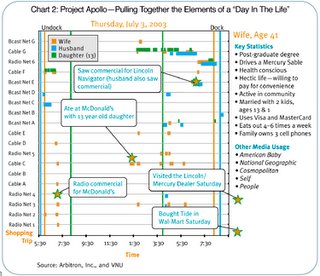Apollo, When Will We Have Liftoff?

Again kudos out to Marshall Sponder, who writes about Project Apollo, an effort led by ACNielsen to piece together the elements necessary to afford an offline or multi-channel marketer the same measurability to ROI that we operating primarily on the Internet have come to expect.
That article led me, in turn, to read about the Arbitron Portable People Meter (PPM):
The PPM resembles a pager. The passive device automatically records the wearer's exposure to any medium that has inserted an inaudible code into its audio programming using an Arbitron PPM encoder. When a unique, inaudible code is detected, the PPM registers, records and time-stamps the signal. At day's end, the media history is downloaded by a docking station that simultaneously recharges the PPM unit.
Portability ensures that all exposures register, from conventional broadcast media to in-store vehicles, from entertainment venues to streaming media, from video games to the Internet.
The Closed Loop System
The entire multi-media tracking system comprises five
elements, the:
encoder installed at the broadcast signal source inserts an inaudible identification code into the audio stream,
station monitor ensures proper encoding at the signal source,
portable people meter carried by consumer panel members records the inaudible codes embedded in programming,
docking station recharges the meters overnight and downloads information from the handheld units, and
household hub collects information from the docking station and transmits the data via phone lines overnight.
Looking at the description of PPM on ACNielsen's Project Apollo website, it really starts to sound realistic to expect that in the next 5-10 years we'll have the type of measurability for TV, radio, print, outdoor and in-store media that we've come to expect from paid search.
Apollo, when will we have lift-off?


